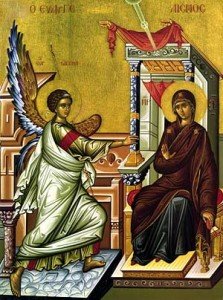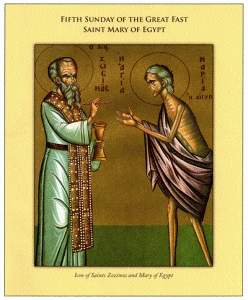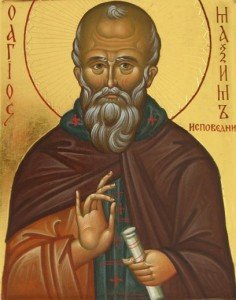O Lord, Jesus Christ, when I reflect upon all the events in Your life, I realize that Your life truly is Divine Revelation about human earthly existence. You revealed to humankind the meaning and purpose of life and how to deal with the various challenges of life. You revealed the attitudes of mind that I must have in order to be the person I was created to be. I ask from you the gift of courage and insight to do all in my power to imitate Jesus Christ, believing that He is the way, the truth and the light. Help me to unconditionally love others as He did and to imitate His way of dealing with the stresses and challenges of life. As I request Your help, O God, I offer my praise to You, Who I know to be Father, Son and Holy Spirit, not only now but forever and ever. Amen.
 We celebrate today, O Heavenly Father, the revelation of an eternal mystery: the Son of God becomes a virgin’s Son and Gabriel announces this grace. Help me to join with the choir of angels in saying: O Mother of God, I, your servant, sing a hymn of thanks to you, a hymn of triumph to a valiant leader. Help me, O Lord, to voluntarily give myself to bearing witness in my world to Your great love as demonstrated by Your incarnation as a human. As I request Your help, O God, I offer my praise to You, Who I know to be Father, Son and Holy Spirit, not only now but forever and ever. Amen.
We celebrate today, O Heavenly Father, the revelation of an eternal mystery: the Son of God becomes a virgin’s Son and Gabriel announces this grace. Help me to join with the choir of angels in saying: O Mother of God, I, your servant, sing a hymn of thanks to you, a hymn of triumph to a valiant leader. Help me, O Lord, to voluntarily give myself to bearing witness in my world to Your great love as demonstrated by Your incarnation as a human. As I request Your help, O God, I offer my praise to You, Who I know to be Father, Son and Holy Spirit, not only now but forever and ever. Amen.
O Heavenly Father, the days of the Great Fast are quickly passing. I humbly ask You to help me prepare myself for the celebration of Great and Holy Week and Pascha. I ask Your help, O Father, to truly see and understand the revelation You are making to me through the celebration of the life and death of Your Son, Jesus Christ. Help me, Father, to learn from Jesus how to live my life – how to deal with the challenges and sufferings that are a part of every life. Give me the strength to imitate Christ to the best of my ability and to embrace each challenge and suffering as an opportunity to place my hope and trust in You. As I request Your help, O God, I offer my praise to You, Who I know to be Father, Son and Holy Spirit, not only now but forever and ever. Amen.
O Christ our God, the power of Your Cross worked wonders for Mary of Egypt. Casting off the weakness of her nature, she allowed Your image to shine forth from her as she carried her cross. She cast out the darkness of sin and followed the light of penance. She seized the opportunity given to her by life and transformed herself truly into a child of God. Now as a saint in heaven, she has obtained the prize of victory and intercedes for our souls if only we ask her help. As I request Your help, O God, I offer my praise to You, Who I know to be Father, Son and Holy Spirit, not only now but forever and ever. Amen.
Anyone who aspires to greatness must serve the rest;
whoever wants to rank first among you must serve the needs of all.
The Son of Man has not come to be served but to serve.
As we get ever closer to the Great and Holy Week, that special week each year which is set aside for us to contemplate on the revelation of God through Jesus about the meaning and purpose of human life, our Church commemorates our Mother among the saints, Mary of Egypt. This follows upon our commemoration of our Father among the saints, John Climacus. Why does our Church have us remember these two saints immediately before the Great and Holy Week? They are commemorated so that all men and women will come to realize that what is revealed through Jesus by God is meant for all humans, male and female alike. God’s revelation is for all humans.
And what does God reveal to all of us? He reveals to us how we must live. A part of God’s revelation is wonderfully summarized in today’s Gospel reading. The revelation is this: Anyone who aspires to greatness must serve the rest; whoever wants to rank first among you must serve the needs of all.
Consider these words! Service to others is one of the primary aspects of the Christian way of living. When we approach life with the thought of being of service to others, life changes. The truth of this revelation was presented to us by the way Jesus lived. Think about it. The primary focus of His life was service to others. Being of service to others is one of the primary means we have to spiritually grow. When service to others becomes the focus of our lives, we begin to live in a different way. We no longer make ourselves the focus of life! We don’t live just for ourselves. We come to realize that the way we come to truly love God, Who we cannot see, is by serving and truly loving those we can see.
It is essential, however, that we remember that we are called not just to serve those with whom we have a direct relationship but, rather, those who life sends to us.
Think about how Jesus lived His life. He reached out to those He found in need and positively responded to those who sought His help. He always had time for others and never shied away from providing time and help to those He encountered.
It is important to remember that all of us, who say we follow Jesus, focus on being of service to others.
It is my contention that the foundation of Eastern Spirituality is truly the Gospel of John. His Gospel, perhaps more than the other three, leads us inside the true reality of Jesus – leads us in a real sense of God incarnate. His Gospel leads us to the belief that God is not only deeply in love with us, the portion of His creation that He made in His image and likeness, but that He constantly calls us to freely return His love. God bestowed on us free will so that we might freely return His love,
John begins his Gospel just as the Old Testament begins: In the beginning…. But the writer or writers of the Book of Genesis bring the reader to the first moment of creation. A spark exploded as it crackled and shot forth from the mighty heart of God. John, however, leads us beyond the first moment of material creation and places us, his readers, back into the very heart of God as a community.
God is othering Himself as He begets Himself and His Word from all eternity. The same presence of God as self-emptying love – depicted in Genesis as a Spirit that hovers like a mighty cosmic bird over the chaos and the void – is hiddenly present as the bonding love between the Divine Mind and the Divine Word. John would soon reveal His name as the Holy Spirit.
Thus John wishes us to be grounded, if we are to become the community of God’s love on this earth, in the very primal community of love: Father, Son and Holy Spirit.
Truly grounded in the Trinitarian community of love as the Source of all reality and life, John wishes to establish the Word’s role, not only in human salvation, but also in the entire cosmos. He first establishes the eternal pre-existence of the Logos (Word). At the beginning of time, when the material world first came into existence, this Word (Christ) was in full being.
I ended the last installment of this article with the thoughts of the Greek Fathers of the Church on the true destiny of humankind. They asserted that the goal of human existence is participation in God – deification. Maximus describes deification as a participation of the whole man in the whole God. He wrote:
In the same way in which the soul and the body are united, God should become accessible for participation by the soul and, through the soul’s intermediary, by the body, immortality; and finally that the whole man should become God deified by the grace of God-become-man, becoming whole man, soul and body, by nature, and becoming whole God, soul and body, by grace.
Thus for Maximus the doctrinal basis of man’s deification is clearly to be found in hypostatic unity between the divine and the human nature in Christ. Christ, as God’s revelation, can be considered the archetype of human beings.
The man Jesus is God hypostatically, and, therefore, in Him there is a communication of the energies divine and human. This communication also reaches those who are in Christ. But they, of course, are human hypostases, and are united to God not hypostatically but only by grace or by energy. A man who becomes obedient to God in all things hears God saying: said: you are gods’; he then is God and is called God not by nature or by relation but by divine decree and grace. It is not through his own activity or energy that man can be deified but by divine energy, to which his human activity is obedient.
This, I know, is dense – difficult to understand. If, however, we keep in the forefront of our minds that the destiny of all humans is union with God in some real way, this begins to make more sense.
The Greek Fathers, you can tell, drew upon philosophy to find the words to describe what the relationship is between God and humankind. It all goes back to a core truth first revealed in the Old Testament: man was made in the image and the likeness of God. This is what we must struggle to understand. When we can come to an understanding of this real description of who we are in God’s creation, then we begin to see the real reason for us to do all within our power to imitate Christ.
So ask yourself: What does it mean that I am made in the image and likeness of God? The answer to this very important question is the beginning of Eastern Spirituality. If I am made in His image and likeness, it means that the whole purpose of this earthly existence is to discover the real meaning of this and to then do all in my power to make this really true in my life. God became man so that man might become God.
As I shared in the last installment of this article, the Liturgy of Basil the Great, which is the prescribed liturgy of the Great Fast, was the result of Basil shortening an existing Liturgy that was used in Jerusalem. Over time, however, the core of his Liturgy, namely the Anaphora, was expanded through the insertion of creedal statements. These statements are embedded in the priestly prayers that are taken, in part, in silence.
In particular the prayer after the Holy, Holy, Holy and the expansion of the Anamnesis were influenced by the Christological debates of that period. These changes appear to have been influenced by the dogmatic definitions of the Synods of Antioch in 341 and 345. According to the tradition of the Eastern Church, this Liturgy is practically the work of St. Basil with due allowance made for changes that happened in the course of time. It is older than either of the other two Byzantine Liturgies, namely that of John Chrysostom and the Presanctified Liturgy.
Tradition also tells us that Basil was instrumental in creating several other Anaphoras which are used by various Eastern Churches. These may be classified into two families: Caesarian (Byzantine) and Alexandrian (Coptic). The Syriac and Armenian Anaphoras are probably derived from the Byzantine Greek with some modifications. The Ethiopian is a translation of the Coptic Anaphora, while the Coptic, Arabic and Greek Egyptian liturgies are substantially the same. These Egyptian Anaphoras of St. Basil are different from the Byzantine liturgy and do not possess all the characteristics of the standard Alexandrian Rite but appear rather to be modeled on the Syrian type, so they are probably an importation into Egypt. The Greek Egyptian contains several prayers (identical with those in the Byzantine liturgy) expressly ascribed to St. Basil and from these it may derive its title.
If you have a chance, you should take home (and then bring back) a Basil the Great Liturgy booklet and read the priestly prayers which I only partially say aloud. The prayers are magnificent, albeit, longer than Chrysostom’s Liturgy. I know that, because of their length, I read that rather quickly and some may find it difficult to truly grasp the depth of the prayers.
It must be remembered that in the early Church the Anaphoras were not standardized but left, rather, to the spontaneous creativity of the celebrant.
Our journey to holiness, as I shared in the last installment of this article, is facilitated by honest self-examination. We first discover where we have failed to unconditionally lover others.
Seeing how well we have done on the journey is also important because sometimes the temptation is not to abandon the journey in some act of apostasy, but rather to forget that we are on a journey. Old habits creep back in. Unconverted ways of thinking assert themselves. Destructive ways of handling feelings continue to influence our choices and decisions. We allow the journey and the graced moments of life to wither from lack of attention.
Review and examination are the discipline we practice to keep the old, rejected spirits from taking up their residence in us once again. Try sitting quietly and just think about your life.
Our Church introduces the Great and Holy Week by commemorating Jesus raising Lazarus from the dead. This event prefigures Jesus’ resurrection from the dead and also declares the truth about human immortality. We use the following Tropar for this celebration.
O Christ our God, You confirmed the resurrection of all before the time of You passion by raising Lazarus from the dead. Therefore, we as the children of Israel carry the symbols of victory and cry out to You, the Conqueror of Death: “Hosanna in the highest! Blessed is He Who comes in the name of the Lord”.
For six days preceding Lazarus Saturday and Palm Sunday, the liturgy of the Church makes us follow Christ as He first announced the death of His friend and then begins His journey to Bethany and Jerusalem.
The center of attention is Lazarus – his sickness, his death, the grief of his relatives and Christ’s reaction to all of this. The entire week is spent in the spiritual contemplation of the forthcoming encounter between Christ and Death – first in the person of His friend, Lazarus; then in Christ’s own death. It is the approach of that hour of Christ of which He so often spoke and toward which all His earthly ministry was oriented. And we must ask: What is the place and the meaning of this contemplation in the lenten liturgy? How is it related to our own lenten effort? It is important that we attempt to answer these questions for ourselves. Recall the fact that our Church, when she celebrates these events in the life of Christ, always uses the present tense of the verb. Today Christ is born! Today Christ enters the city of Jerusalem! Today Christ is raised from the dead! She sees these events as ongoing. I believe we must ask: What is the meaning of this transposition; the significance of this liturgical today?
One can say without exaggeration that the whole life of the Church is one continuous commemoration and remembrance. The Church IS the remembrance of Christ. Just as the Divine Liturgy is the real remembrance of Christ’s presence among us. Christ is present and His presence is real. So when we celebrate the events of His life, He is truly present with us. Of course if we don’t open our minds and hearts we will not experience Him as present.
Further, since there is no time in the spiritual dimension where God is, all things are present – all things are happening right now. This approach to the celebration of Jesus’ life is truly one of the unique aspects of our Church.


